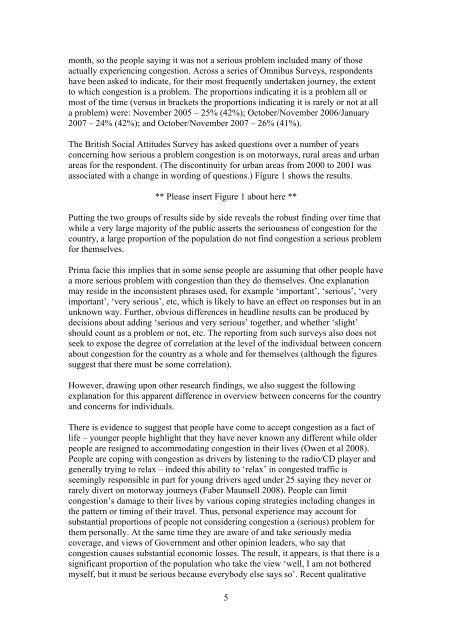Goodwin, P. and Lyons, G. (2009) Public attitudes to transport ...
Goodwin, P. and Lyons, G. (2009) Public attitudes to transport ...
Goodwin, P. and Lyons, G. (2009) Public attitudes to transport ...
You also want an ePaper? Increase the reach of your titles
YUMPU automatically turns print PDFs into web optimized ePapers that Google loves.
month, so the people saying it was not a serious problem included many of those<br />
actually experiencing congestion. Across a series of Omnibus Surveys, respondents<br />
have been asked <strong>to</strong> indicate, for their most frequently undertaken journey, the extent<br />
<strong>to</strong> which congestion is a problem. The proportions indicating it is a problem all or<br />
most of the time (versus in brackets the proportions indicating it is rarely or not at all<br />
a problem) were: November 2005 – 25% (42%); Oc<strong>to</strong>ber/November 2006/January<br />
2007 – 24% (42%); <strong>and</strong> Oc<strong>to</strong>ber/November 2007 – 26% (41%).<br />
The British Social Attitudes Survey has asked questions over a number of years<br />
concerning how serious a problem congestion is on mo<strong>to</strong>rways, rural areas <strong>and</strong> urban<br />
areas for the respondent. (The discontinuity for urban areas from 2000 <strong>to</strong> 2001 was<br />
associated with a change in wording of questions.) Figure 1 shows the results.<br />
** Please insert Figure 1 about here **<br />
Putting the two groups of results side by side reveals the robust finding over time that<br />
while a very large majority of the public asserts the seriousness of congestion for the<br />
country, a large proportion of the population do not find congestion a serious problem<br />
for themselves.<br />
Prima facie this implies that in some sense people are assuming that other people have<br />
a more serious problem with congestion than they do themselves. One explanation<br />
may reside in the inconsistent phrases used, for example ‘important’, ‘serious’, ‘very<br />
important’, ‘very serious’, etc, which is likely <strong>to</strong> have an effect on responses but in an<br />
unknown way. Further, obvious differences in headline results can be produced by<br />
decisions about adding ‘serious <strong>and</strong> very serious’ <strong>to</strong>gether, <strong>and</strong> whether ‘slight’<br />
should count as a problem or not, etc. The reporting from such surveys also does not<br />
seek <strong>to</strong> expose the degree of correlation at the level of the individual between concern<br />
about congestion for the country as a whole <strong>and</strong> for themselves (although the figures<br />
suggest that there must be some correlation).<br />
However, drawing upon other research findings, we also suggest the following<br />
explanation for this apparent difference in overview between concerns for the country<br />
<strong>and</strong> concerns for individuals.<br />
There is evidence <strong>to</strong> suggest that people have come <strong>to</strong> accept congestion as a fact of<br />
life – younger people highlight that they have never known any different while older<br />
people are resigned <strong>to</strong> accommodating congestion in their lives (Owen et al 2008).<br />
People are coping with congestion as drivers by listening <strong>to</strong> the radio/CD player <strong>and</strong><br />
generally trying <strong>to</strong> relax – indeed this ability <strong>to</strong> ‘relax’ in congested traffic is<br />
seemingly responsible in part for young drivers aged under 25 saying they never or<br />
rarely divert on mo<strong>to</strong>rway journeys (Faber Maunsell 2008). People can limit<br />
congestion’s damage <strong>to</strong> their lives by various coping strategies including changes in<br />
the pattern or timing of their travel. Thus, personal experience may account for<br />
substantial proportions of people not considering congestion a (serious) problem for<br />
them personally. At the same time they are aware of <strong>and</strong> take seriously media<br />
coverage, <strong>and</strong> views of Government <strong>and</strong> other opinion leaders, who say that<br />
congestion causes substantial economic losses. The result, it appears, is that there is a<br />
significant proportion of the population who take the view ‘well, I am not bothered<br />
myself, but it must be serious because everybody else says so’. Recent qualitative<br />
5

















